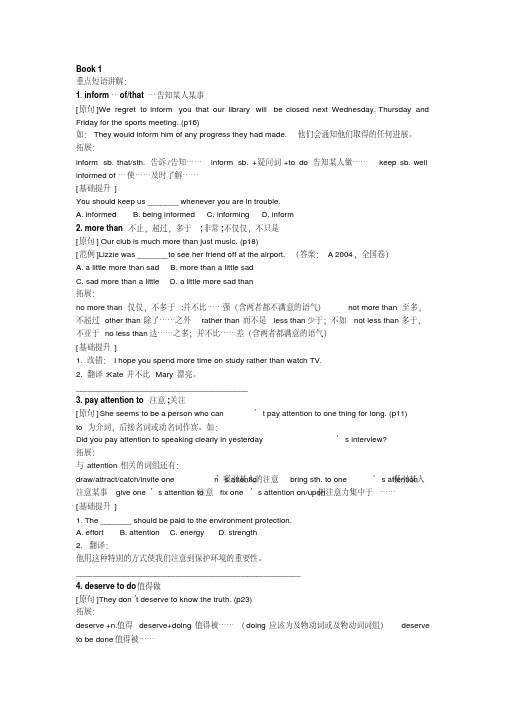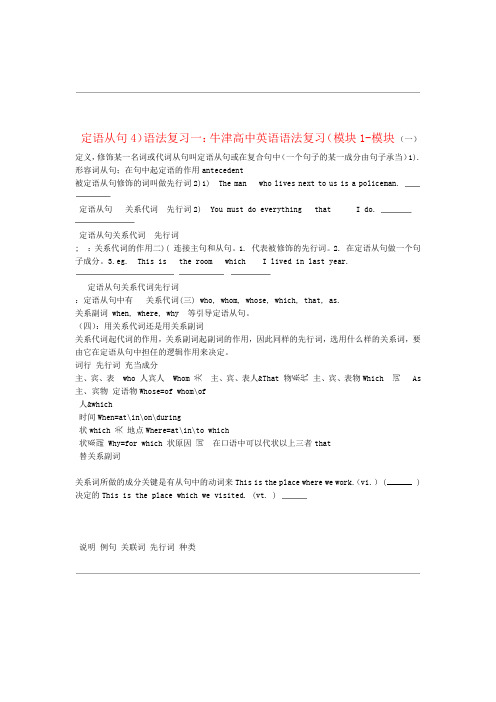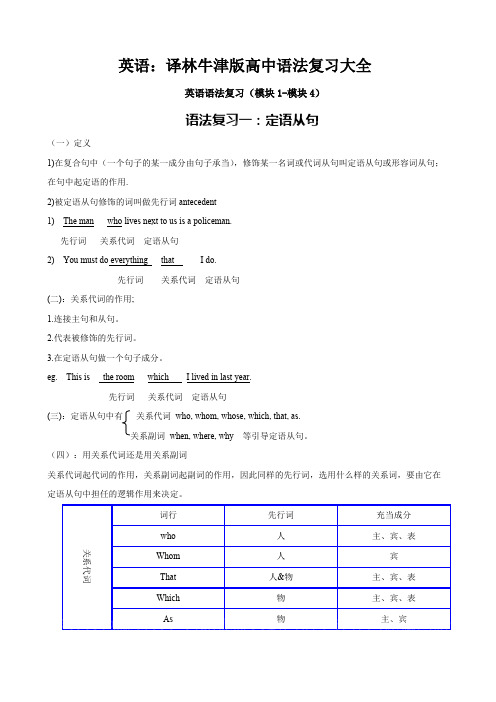牛津高中英语模块一至四语法总结及练习
- 格式:docx
- 大小:1.68 MB
- 文档页数:51


高中英语模块一UNIT3一、重要单词:1.makemake up 编造;化妆make out 看出,辨认出;理解;填写,写出,拼凑make up for 弥补be made up of(=consist of) 由……组成make up one’s mind下定决心,打定主意2.stay/remainstay up late 熬夜stay young/healthy 保持年轻/健康remain (to be) very weak 任然很虚弱3.exercisetake more exercise 多锻炼 a good form of exercise 一个良好的训练形式do a lot of exercises in English grammar 进行大量的英语语法练习do morning/eye exercises 做早操/眼保健操4.diedie from……(polluted air,overwork) 死于(外因)die of……(cancer,grief,hunger,anger) 死于(内因)be dying for sth/to do sth. 渴望做某事deadly disease 致命的疾病die happy 安乐死die out 绝种die down (风力、声音等)渐渐消失,平息,变弱5.辨析:another 同类的另一个,接可数名词单数或接数词加可数名词复数the other 常用语one……the other……the others (有范围的)其他的others (无范围的)其他的6.辨析:especially 尤其(=particularly)particularly 尤其(in particular);对……挑剔(be particularly about)【注:particular in spring 尤其在春天(不能用especially)】specially 特别、专程(例如at a special price)7.weigh[v.] weight[n.] weighty[adj.]put on weight 增重lose weight 减肥weigh two kg 重达两千克(不用被动语态)have one’s luggage weighed 给行李称过重8.agreeagree to do sth. 同意做某事agree that……同意……agree with one’s ideas/what sb. does 同意某人的观点/所做的事agree to……(term,plan,proposal,suggestion,advice) 同意/接受agree on……在……上达成共识9.recover[v.] recovery[n.]recover from……从……中恢复过recover oneself 恢复神智recover sth. from 从中找回某物;重新获得10.matchmatch sb. in sth. 在某方面比得过某人match……=go with 和……相配a good match for 对……来说很得体strike a match 擦火柴11.辨析:damage毁坏,损害,损失,不如destroy严重,且一定程度上可恢复destroy (毁灭性的)破坏,程度很深harm 对……有害(do harm to),暗示不良后果ruin 破坏(美好的东西)(in ruins变成废墟)12.worth值得做……be worth sth./doing sth.be worthy of being doneto be donebe worthwhile doing/to do sth.13.dietgo on diets/a diet 节食put sb. on a diet 控制某人饮食14.每隔一天every other dayevery second dayevery two days15.consider[v]consider sth./sb. as 把……当做……consider sth/ding sth/what to do 考虑take ……into consideration/account 把……考虑进去16.effect[n.] affect[v.]have/produce an effect on ……对……产生影响side effect 副作用come into effect 生效be much affect by……被感动17.riskrisk doing sth. 冒险做某事at/take/run the risk of……冒着……风险at risk 处境危险risk one’s life 冒着生命危险18.marry[v.] marriage[n.]marry A to B 把A嫁给B marry sb. 嫁给某人be married to sb 嫁给某人(表状态)be engaged to sb 订婚be engaged in sth. 忙于做某事be married well 嫁给了有钱人19.offeroffer to do sth. 主动提出做……offer sb. sth./offer sth. to sb. 向某人提供某物offer sb. money for 给某人出钱买offer sb. sth.for money 有偿地卖给某人某物20.wayby the way 顺便说下on the way 在路上;即将发生in the way 挡路in a way 在某种程度上all the way 一路上no way 没门21.troublehave trouble in doing sth. 做某事遇到麻烦take the great trouble to do sth. 不辞辛劳地做某事put sb. to the trouble of doing sth. 给某人添麻烦;使某人为做某事而为难二、重点词组:1. work outa. 锻炼身体,做运动I would work out in the gym after work when I was in Nanjing.b. 算出,计算Please work out the answer.c.. 解决,处理Don’t get down. Things will work out eventually.d. 计划,制定出When you began to work,you might work out a practical scheme. work out to/at 总计达…The bill works out to £10.work on sth./ doing sth. 从事,致力于… I worked on (writing) this article all night.work on sb. to do sth. 劝说某人做某事My parents spent the whole weekend working on me to go on holiday with them.2.figure outa. 算出;想出;解决It took me hours to figure out those algebra problems.b. 理解,将… …弄明白I can’t figure him out.figure on sth./ doing sth. 料想…,打算干…I didn’t figure on meeting her there3. ashameda. be ashamed of sth./sb./doing sth./having done sth.由于(某人/某事/做了某事)而羞愧b. be ashamed to do sth. 耻于做某事,因觉得可耻而不做…c. be ashamed to have done sth. 由于做了某事而羞愧d. be ashamed that …… 羞于某事He was ashamed of asking/having asked/to have asked such a simple question.He was ashamed that he had asked such a simple question.4. prefer(1) prefer+名词——Would you like meat or fish? ——I'd prefer meat,please.(2) prefer+动名词Do you prefer cooking for yourself or eating in a restaurant?(3) prefer+不定式I prefer to spend the weekend at home.(4) prefer sb. to do sth. Their father prefers them to be home early.(5) prefer A to B 在本句型中,A与B是平行结构,可以是名词,也可以都是动名词。

定语从句4)语法复习一:牛津高中英语语法复习(模块1-模块(一)定义,修饰某一名词或代词从句叫定语从句或在复合句中(一个句子的某一成分由句子承当)1). 形容词从句;在句中起定语的作用antecedent被定语从句修饰的词叫做先行词2)1) The man who lives next to us is a policeman.定语从句关系代词先行词2) You must do everything that I do.定语从句关系代词先行词; :关系代词的作用二)( 连接主句和从句。
1. 代表被修饰的先行词。
2. 在定语从句做一个句子成分。
3.eg. This is the room which I lived in last year.定语从句关系代词先行词:定语从句中有关系代词(三) who, whom, whose, which, that, as.关系副词 when, where, why 等引导定语从句。
(四):用关系代词还是用关系副词关系代词起代词的作用,关系副词起副词的作用,因此同样的先行词,选用什么样的关系词,要由它在定语从句中担任的逻辑作用来决定。
词行先行词充当成分主、宾、表 who 人宾人 Whom 关主、宾、表人&That 物系代主、宾、表物Which 词 As 主、宾物定语物Whose=of whom\of人&which时间When=at\in\on\during状which 关地点Where=at\in\to which状系副 Why=for which 状原因词在口语中可以代状以上三者that替关系副词关系词所做的成分关键是有从句中的动词来This is the place where we work.(vi.) () 决定的This is the place which we visited. (vt. )说明例句关联词先行词种类注:先行词是time, minute, moment, next time很少用关系副词when,可用that 但通常省去。

高中牛津英语一定语从句:定语从句的介绍就像是一个形容词或介词短语修饰名词一样,定语从句也可以修饰名词。
定语从句所修饰的名词称为先行词。
形容词:The green team介词短语:The team in green定语从句:The team who were wearing green定语从句通常由关系代词来引导,如which, that, who, whom, whose,或关系副词来引导,如when, where, why。
关系代词可以在定语从句中担当主语,宾语,表语,定语;关系副词可以在定语从句中担当状语。
如:做主语The trees which are on the school campus have lost their leaves.做宾语The student whom we saw just now is the best runner in our school.做表语Jack is no longer the lazy boy that he used to be.做定语She has a brother whose name I can’t remember.做状语The school where he studied is in Shenzhen.二定语从句:关系代词:that,which,who,whom,和whose在定语从句中,that和which用来指代物。
如:This is the story that /which we wrote for our storytelling contest.在定语从句中,who 用来指代人。
如:I am going to see a friend who has just come back from the UK.当who在定语从句中做宾语时,可以用whom来取代,且whom比who更正式。
如:I don’t know the name of the teacher who/whom I saw in the computer room the other day.当关系代词在定语从句中做宾语时,who,whom,which和that可以被省略。

牛津高中英语-模块一第一单元一定语从句:定语从句的介绍1.就像是一个形容词或介词短语修饰名词同样,定语从句也能够修饰名词。
定语从句所修饰的名词称为先行词。
形容词: The green team介词短语: The team in green定语从句: The team who were wearing green2.定语从句往常由关系代词来指引,如 which, that, who, whom, whose,或关系副词来指引,如when, where, why 。
关系代词能够在定语从句中担当主语,宾语,表语,定语;关系副词能够在定语从句中担当状语。
如:做主语 The trees which are on the school campus have lost their leaves. 做宾语 The student whom we saw just now is the best runner in our school. 做表语 Jack is no longer the lazy boy that he used to be.做定语 She has a brother whose name I can t remember’.做状语 The school where he studied is in Shenzhen.二定语从句:关系代词:that ,which ,who,whom,和 whose1.在定语从句中, that 和 which 用来指代物。
eg: This is the story that /which we wrote for our storytelling contest.2.在定语从句中, who 用来指代人。
eg: I am going to see a friend who has just come back from the UK.3.当 who 在定语从句中做宾语时,能够用whom 来代替,且 whom 比 who 改正式。

英语:译林牛津版高中语法复习大全英语语法复习(模块1-模块4)语法复习一:定语从句(一)定义1)在复合句中(一个句子的某一成分由句子承当),修饰某一名词或代词从句叫定语从句或形容词从句;在句中起定语的作用.2)被定语从句修饰的词叫做先行词antecedent1) The man who lives next to us is a policeman.先行词关系代词定语从句2) You must do everything that I do.先行词关系代词定语从句(二):关系代词的作用;1.连接主句和从句。
2.代表被修饰的先行词。
3.在定语从句做一个句子成分。
eg. This is the room which I lived in last year.先行词关系代词定语从句(三):定语从句中有关系代词who, whom, whose, which, that, as.关系副词when, where, why 等引导定语从句。
(四):用关系代词还是用关系副词关系代词起代词的作用,关系副词起副词的作用,因此同样的先行词,选用什么样的关系词,要由它在定语从句中担任的逻辑作用来决定。
词行先行词充当成分who人主、宾、表关系代词Whom人宾That人&物主、宾、表Which物主、宾、表As物主、宾Whose=of whom\of which人&物定语When=at\in\on\during which时间状Where=at\in\to which地点状关系副词Why=for which原因状that 在口语中可以代替关以上三者状系副词This is the place where we work.(vi.)(关系词所做的成分关键是有从句中的动词来决定的) This is the place which we visited. (vt. )注:先行词是time, minute, moment, next time很少用关系副词when,可用that 但通常省去。
2牛津高中英语模块一至四语法总结及练习编辑整理:尊敬的读者朋友们:这里是精品文档编辑中心,本文档内容是由我和我的同事精心编辑整理后发布的,发布之前我们对文中内容进行仔细校对,但是难免会有疏漏的地方,但是任然希望(2牛津高中英语模块一至四语法总结及练习)的内容能够给您的工作和学习带来便利。
同时也真诚的希望收到您的建议和反馈,这将是我们进步的源泉,前进的动力。
本文可编辑可修改,如果觉得对您有帮助请收藏以便随时查阅,最后祝您生活愉快业绩进步,以下为2牛津高中英语模块一至四语法总结及练习的全部内容。
牛津英语模块1至模块4语法总结及练习第一单元一定语从句:定语从句的介绍1.就像是一个形容词或介词短语修饰名词一样,定语从句也可以修饰名词。
定语从句所修饰的名词称为先行词。
形容词: The green team介词短语:The team in green定语从句:The team who were wearing green2.定语从句通常由关系代词来引导,如which, that, who, whom, whose,或关系副词来引导,如when, where, why.关系代词可以在定语从句中担当主语,宾语,表语,定语;关系副词可以在定语从句中担当状语。
如:做主语The trees which are on the school campus have lost their leaves。
做宾语The student whom we saw just now is the best runner in our school。
做表语Jack is no longer the lazy boy that he used to be.做定语She has a brother whose name I can’t remember。
做状语The school where he studied is in Shenzhen。
牛津高中英语-模块一至模块十语法牛津高中英语-模块一第一单元一定语从句:定语从句的介绍1.就像是一个形容词或介词短语修饰名词相同,定语从句也能够修饰名词。
定语从句所修饰的名词称为先行词。
形容词: The green team介词短语: The team in green定语从句: The team who were wearing green2.定语从句往常由关系代词来指引,如which, that,who, whom, whose,或关系副词来指引,如when, where, why。
关系代词能够在定语从句中担当主语,宾语,表语,定语;关系副词能够在定语从句中担当状语。
如:做主语 The trees which are on the school campus have lost theirleaves.做宾语 The student whom we saw just now is the best runner in our school.做表语 Jack is no longer the lazy boy that he used to be.做定语 She has a b rother whose name I can’t remember.做状语 The school where he studied is in Shenzhen.二定语从句:关系代词:that , which ,who,whom,和 whose1.在定语从句中,that和which用来指代物。
如: This is the story that /which we wrote for our storytelling contest. 2.在定语从句中, who 用来指代人。
如: I am going to see a friend who has just come back from the UK.3.当who在定语从句中做宾语时,能够用whom来取代,且whom比who改正式。
4模块Unit1 Advertising重点短语1. be aware of 知道,明白,意识到I want you to be aware of the sItuatIon before It effects you.我希望在情况影响你前,你能察觉到。
2. play tricks on 欺骗,捉弄I'll give him play tricks on me, the low-down thing! He'll go straight down to the police station!这狗东西,在我跟前使巧,送他公安局去!3. believe in 信任,相信4. be bored with 对……感到厌倦5. appeal to迎合,对……有吸引力Blue and red appeal to me, but I don’t like Gray or yellow蓝色和红色投我所好然而我不喜欢灰色和黄色。
6. trick sb into doing sth诱使某人做某事7. be satisfied with 对……感到满意Think about the misforture of others that you may be satisfied with your own lot想想别人的不幸,你可以对自己的命运感到满足8. be used to对……习以为常,习惯于There are a few verbs which fit into both groups and a hyphenmay be used to show the distinction还有一些动词适合于上述两种情况,可用连接号表示这种区别9. fall for 上……的当,受……骗I can't believe you would fall FOR that old trick.我不相信你会上那老把戏的当。
牛津高中英语语法模块一至模块十语法-CAL-FENGHAI.-(YICAI)-Company One1牛津高中英语-模块一至模块十语法牛津高中英语-模块一第一单元一定语从句:定语从句的介绍1.就像是一个形容词或介词短语修饰名词一样,定语从句也可以修饰名词。
定语从句所修饰的名词称为先行词。
形容词:The green team介词短语:The team in green定语从句:The team who were wearing green2.定语从句通常由关系代词来引导,如which, that, who, whom, whose,或关系副词来引导,如when, where, why。
关系代词可以在定语从句中担当主语,宾语,表语,定语;关系副词可以在定语从句中担当状语。
如:做主语The trees which are on the school campus have lost their leaves.做宾语The student whom we saw just now is the best runner in our school.做表语Jack is no longer the lazy boy that he used to be.做定语She has a brother whose name I can’t remember.做状语The school where he studied is in Shenzhen.二定语从句:关系代词:that,which,who,whom,和whose1.在定语从句中,that和which用来指代物。
如:This is the story that /which we wrote for our storytelling contest.2.在定语从句中,who 用来指代人。
如:I am going to see a friend who has just come back from the UK. 3.当who在定语从句中做宾语时,可以用whom来取代,且whom比who更正式。
牛津高中英语模块一至四语法总结及练习Revised by Hanlin on 10 January 2021牛津英语模块1至模块4语法总结及练习第一单元一定语从句:定语从句的介绍1.就像是一个形容词或介词短语修饰名词一样,定语从句也可以修饰名词。
定语从句所修饰的名词称为先行词。
形容词:The green team介词短语:The team in green定语从句:The team who were wearing green2.定语从句通常由关系代词来引导,如which, that, who, whom, whose,或关系副词来引导,如when, where, why。
关系代词可以在定语从句中担当主语,宾语,表语,定语;关系副词可以在定语从句中担当状语。
如:做主语The trees which are on the school campus have lost their leaves.做宾语The student whom we saw just now is the best runner in our school.做表语Jack is no longer the lazy boy that he used to be.做定语She has a brother whose name I can’t remember.做状语The school where he studied is in Shenzhen.二定语从句:关系代词:that,which,who,whom,和whose1.在定语从句中,that和which用来指代物。
eg:This is the story that /which we wrote for our storytelling contest.2.在定语从句中,who 用来指代人。
eg:I am going to see a friend who has just come back from the UK.3.当who在定语从句中做宾语时,可以用whom来取代,且whom比who更正式。
eg:I don’t know the name of the teacher who/whom I saw in th e computer room the other day.4.当关系代词在定语从句中做宾语时,who,whom,which和that可以被省略。
eg:He likes all the birthday presents(that/which)his friends gave him.5.Whose用来表示所属,它既可指人也可指物。
eg:I sat next to a girl whose name was Diane.The club whose members are music fans meet in the school gardenevery Saturday afternoon.第二单元一定语从句:介词提前的定语从句(preposition+which; preposition+whom)1.当关系代词(which/whom)做定语从句中介词的宾语时,可以把介词提到关系代词的前面。
eg:We thought you were a person from whom we could expect good decisions.2.在非正式英语中,介词通常放在定语从句的最后。
eg:Art is the subject which I know little about.3.如果介词放在定语从句的最后,which 可以被that取代,whom可以被that和who取代。
eg:Dad is a person whom/that/who I can easily talk to.4.当关系代词做定语从句中介词的宾语,并且介词又放在定语从句的末尾时,我们通常省略关系代词who和that。
eg:The topic (which) Eric is interested in is Physics.Daniel is the person (whom) I want to make friends with.5.当先行词是way时,我们用in which或that来引导定语从句,这种情况下,in which或that 可以被省略。
eg:I didn’t like the way (that /in which) she talked to me.二定语从句:关系副词:when,where,why1.我们通常用关系副词when 引导先行词是time,moment,day,season,year 等的定语从句。
eg:Do you remember the day when we left you in charge?I often think of the moment when I saw the UFO.2.我们通常用关系副词where引导先行词是place,house,city,country,city,world等的定语从句。
eg:The police searched the house where the thief had stayed.This is not a family where bad behavior goes unpunished.3.我们通常用关系副词why引导先行词是reason的定语从句。
eg:I don’t know the reason why the house is so dirty.4.在更加正式的英语中,where,when和why能够被介词+which 所替代。
eg:The study is the place where/in which I often have talks with my father.This is the reason why/for which my parents got home earlier.It rained the whole day when/on which he traveled with his family.第三单元一定语从句:非限制性定语从句1.非限制性定语从句是一个为主句添加额外信息的从句,在非限制性定语从句前通常有个逗号。
eg:Amy, who took weight-loss pills, now realizes that health is important.My pills are in the bathroom, where I always keep them.2.当先行词是整个主句时,可以用which来引导定语从句。
eg:He missed the show, which was a great pity.3.我们可以用all+whom/which 来表示全部数量,用some of+whom/which来表示部分数量。
eg:I am doing different types of exercises, all of which are quite helpful to my health.Many people, some of whom are not overweight, are going on diet.定语从句练习1. Is this the factory __________ you visited the other day?A. thatB. whereC. in whichD. the one2. Is this factory __________ some foreign friends visited last Friday?A. thatB. whereC. whichD. the one3. Is this the factory __________ he worked ten years ago?A. thatB. whereC. whichD. the one4. The wolves hid themselves in the places __________ couldn’t be found.A. thatB. whereC. in whichD. in that5. The freezing point is the temperature __________ water changes into ice.A. at whichB. on thatC. in whichD. of what6. The reason is __________ he is unable to operate the machine.A. becauseB. whyC. thatD. whether7. I’ll tell you __________ he told me last week.A. all whichB. thatC. all thatD. which8. That tree, __________ branches are almost bare, is very old.A. whoseB. of whichC. in whichD. on which9. I have bought the same dress __________ she is wearing.A. asB. thatC. whichD. what10. We’re talking about the piano and the pianist _________ were in the concert we attended last night.A. whichB. whomC. whoD. that11. Anyone __________ this opinion may speak out.A. that againstsB. that againstC. who is againstD. who are against12. Didn’t you see the man __________I nodded just now B. whom I nodded just nowC. I nodded to him just nowD. I nodded to just now13. Is there anything __________ to you?A. that is belongedB. that belongsC. that belongD. which belongs14. ---- “How do you like the book”---- “It’s quite different from __________ I read last month.”A. thatB. whichC. the oneD. the one what15. Mr. Zhang gave the textbook to all the pupils except __________ who had already taken them.A. the onesB. onesC. someD. the others16. The train __________ she was travelling was late.A. whichB. whereC. on whichD. in that17. It’s the third time __________ late this month.A. that you arrivedB. when you arrivedC. that you’ve arrivedD. when you’ve arrived18. May the fourth is the day __________ we Chinese people will never forget.A. whichB. whenC. on whichD. about which19. Is it in that factory __________ “Red Flag” cars are produced?A. in whichB. whereC. whichD. that20. He must be from Africa, __________ can be seen from his skin.A. thatB. asC. whoD. what21. He has two sons, __________ work as chemists.A. two of whomB. both of whomC. both of whichD. all of whom22. I, __________ your good friend, will try my best to help you out.A. who isB. who amC. that isD. what is23. I don’t like __________ you speak to her.A. the wayB. the way in thatC. the way whichD. the way of which24. The two things ______they felt very proud are Jim’s gold watch and Della’s hair.A. about whichB. of whichC. in whichD. for which25. Do you know which hotel __________A. she is stayingB. she is staying inC. is she stayingD. is she staying in26. Who can think of a situation __________ this idiom can be used?A. whichB. thatC. whereD. in that27. The astronaut did many experiments in the spaceship, ___much help for knowing space.which we think it is B. which we think are ofC. of which we think isD. I think which is of28. The great day we looked forward to __________ at lastA. comeB. cameC. comingD. comes29. I like the second football match __________ was held last week.A. whichB. whoC. thatD. /30. This is the very film _______ I've long wished to see.A. whichB. thatC. whoD. whomhouse ______the capitalist used to live in is now a nursery.A. thatB. whereC. whatD. whendoctor did all_______ to save the wounded boy.A. what he couldB. he couldC. everything which he couldD. for which he could do33. _____you know, he is a famous musician.A. AsB. whichC. ThatD./is the only one of the three______ got the new idea.A. who haveB. whom haveC. who hasD. whose hadis the baby____________ tomorrow.A. after whom I shall lookB. whom I shall look afterC. whose I shall look afterD. after whom I shall look after36. These students will graduate from the university next summer, __ they will have studied here for four years.A. by thenB. by that timeC. by what timeD. by which time37. This is the house the window __________ faces the south.A. of whichB. whichC. of itD. whose38. It is five o’clock in the afternoon _________ they arrived at the hotel.A. sinceB. beforeC. whenD. that39. In some countries, _____is called “equality” does not really mean equal rights for all people.A. whichB. whatC. thatD. one40. --- How about the games?---Very interesting, and the ones _____the young men competed were really excitingA. whatB. for whomC. whereD. in which二附加疑问句1.附加疑问句是放在陈述句后面的短问句。